| Listing 1 - 7 of 7 |
Sort by
|
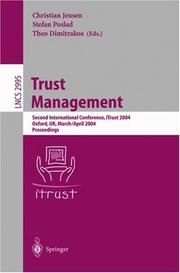
ISBN: 9783540213123 3540213120 Year: 2004 Publisher: Berlin: Springer,
Abstract | Keywords | Export | Availability | Bookmark
 Loading...
Loading...Choose an application
- Reference Manager
- EndNote
- RefWorks (Direct export to RefWorks)
Computer systems - Reliability - Congresses --- Trust - Congresses --- Computer systems --- Trust
Periodical
ISSN: 15455971 Year: 2011 Publisher: New York, N.Y.: IEEE Computer society,
Abstract | Keywords | Export | Availability | Bookmark
 Loading...
Loading...Choose an application
- Reference Manager
- EndNote
- RefWorks (Direct export to RefWorks)
computerkunde --- Computer. Automation --- Electrical engineering --- beveiliging (elektrotechniek) --- Fault-tolerant computing --- Computer systems --- Computer security --- Computer security. --- Fault-tolerant computing. --- Reliability --- Reliability. --- Information Technology --- Computer Security Confidentiality --- Mathematical Sciences --- Applied Mathematics --- Periodicals --- Information Technology. --- Computer Security Confidentiality. --- Elektrotechniek --- Computer. Informatica. Automatisering --- Fault-tolerant computing - Periodicals --- Computer systems - Reliability - Periodicals --- Computer security - Periodicals
Book
ISBN: 1281861685 9786611861681 1848003722 1848003714 1849967946 9781848003712 Year: 2008 Volume: 1614-7839 Publisher: New York, N.Y.: Springer,
Abstract | Keywords | Export | Availability | Bookmark
 Loading...
Loading...Choose an application
- Reference Manager
- EndNote
- RefWorks (Direct export to RefWorks)
What evidence is sufficient to justify the release of a computer-based safety critical system? How should this evidence be presented to certification bodies or regulatory authorities? What best practices should be applied? These are just a few of the questions addressed by Justifying the Dependability of Computer-based Systems, which provides a framework for the justification of the dependability of a computer-based system. The book also explores some of the more fundamental aspects of safety evaluation, such as the nature of models, arguments, evidence and documentation, and the ways to deal with different types of risk and uncertainty. Justifying the Dependability of Computer-based Systems will be of value to software, computer system, instrumentation and control engineers, and regulators working in industry sectors such as nuclear safety. Pierre-Jacques Courtois is a Professor in the Department of Computer Science and Engineering at the Catholic University of Louvain-la-Neuve, with particular research interests in safety-critical software for the nuclear industry. He has more than fifteen years experience in the nuclear safety industry, having worked as a nuclear safety advisor in Finland and the UK, and as a consultant to the International Atomic Energy Agency (IAEA) and the Organisation for Economic Co-operation and Development (OECD).
Engineering. --- Computer organization. --- Computational intelligence. --- Quality control. --- Reliability. --- Industrial safety. --- Quality Control, Reliability, Safety and Risk. --- Engineering, general. --- Computational Intelligence. --- Computer Systems Organization and Communication Networks. --- Industrial accidents --- Industries --- Job safety --- Occupational hazards, Prevention of --- Occupational health and safety --- Occupational safety and health --- Prevention of industrial accidents --- Prevention of occupational hazards --- Safety, Industrial --- Safety engineering --- Safety measures --- Safety of workers --- Accidents --- System safety --- Dependability --- Trustworthiness --- Conduct of life --- Factory management --- Industrial engineering --- Reliability (Engineering) --- Sampling (Statistics) --- Standardization --- Quality assurance --- Quality of products --- Intelligence, Computational --- Artificial intelligence --- Soft computing --- Organization, Computer --- Electronic digital computers --- Construction --- Industrial arts --- Technology --- Prevention --- Computer systems --- Nuclear engineering --- Nuclear power plants --- Safety measures. --- ADP systems (Computer systems) --- Computing systems --- Systems, Computer --- Electronic systems --- Cyberinfrastructure --- System safety. --- Computer network architectures. --- Architectures, Computer network --- Network architectures, Computer --- Computer architecture --- Safety, System --- Safety of systems --- Systems safety --- Industrial safety --- Systems engineering --- Computer systems - Reliability --- Nuclear power plants - Safety measures --- Nuclear engineering - Safety measures
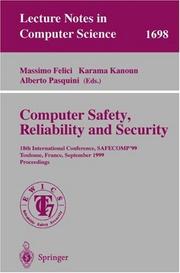
ISBN: 3540664882 9783540664888 3540482490 Year: 1999 Volume: 1698 Publisher: Berlin: Springer,
Abstract | Keywords | Export | Availability | Bookmark
 Loading...
Loading...Choose an application
- Reference Manager
- EndNote
- RefWorks (Direct export to RefWorks)
The European Commission emphasizes, in its Fifth Research Framework, the “. . . emerging generic dependability requirements in the information society, stemming both from the ubiquity and volume of embedded and networked systems and services as well as from the global and complex nature of large scale information and communication infrastructures, from citizens, administrations and business in terms of technologies, tools, systems, applications and services". The series of Conference on Computer Safety, Reliability, and Security (Safecomp) contributes to satisfy these requirements by reviewing the state of the art, experiences, and new trends in the relevant scientific and industrial areas. Safecomp is intended to be a platform for technology transfer among academia, industry, and research institutions, providing the opportunity for exchange of ideas, opinions, and visions among experts. This year Safecomp celebrates the 20th anniversary, its first Conference having been organized in Stuttgart by EWICS (European Workshop on Industrial Computer Systems) in 1979, and we hope these Proceedings will contribute to the celebration by supporting Safecomp aims. The Proceedings include the 25 papers that have been presented orally at the Conference and the full version of the 14 papers that have been presented as posters, all of which were selected from 76 submissions. Papers almost uniformly take up Safecomp topics, dealing with the issues of Safety Assessment and Human Factors, Verification and Validation, Design for Safety, Formal Methods, and Security.
Computer systems --- Computer security --- Reliability --- Computer Science --- Engineering & Applied Sciences --- Computer science. --- Special purpose computers. --- Software engineering. --- Operating systems (Computers). --- Computer logic. --- Management information systems. --- Computer Science. --- Software Engineering/Programming and Operating Systems. --- Operating Systems. --- Logics and Meanings of Programs. --- Special Purpose and Application-Based Systems. --- Management of Computing and Information Systems. --- Logic design. --- Information Systems. --- Design, Logic --- Design of logic systems --- Digital electronics --- Electronic circuit design --- Logic circuits --- Machine theory --- Switching theory --- Computer operating systems --- Computers --- Disk operating systems --- Systems software --- Computer software engineering --- Engineering --- Operating systems --- Informatics --- Science --- Computer-based information systems --- EIS (Information systems) --- Executive information systems --- MIS (Information systems) --- Sociotechnical systems --- Information resources management --- Management --- Special purpose computers --- Computer science logic --- Logic, Symbolic and mathematical --- Communication systems --- Computer systems - Reliability - Congresses --- Computer security - Congresses
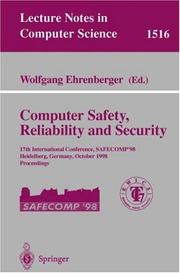
ISSN: 03029743 ISBN: 3540651101 9783540651109 3540496467 Year: 1998 Volume: 1516 Publisher: Berlin: Springer,
Abstract | Keywords | Export | Availability | Bookmark
 Loading...
Loading...Choose an application
- Reference Manager
- EndNote
- RefWorks (Direct export to RefWorks)
Computers and their interactions are becoming the characteristic features of our time: Many people believe that the industrial age is going over into the information age. In the same way as life of the beginning of this century was dominated by machines, factories, streets and railways, the starting century will be characterised by computers and their networks. This change naturally affects also the institutions and the installations our lives depend upon: power plants, including nuclear ones, chemical plants, mechanically working factories, cars, railways and medical equipment; they all depend on computers and their connections. In some cases it is not human life that may be endangered by computer failure, but large investments; e. g. if a whole plant interrupts its production for a long time. In addition to loss of life and property one must not neglect public opinion, which is very critical in many countries against major technical defects. The related computer technology, its hardware, software and production process differ between standard applications and safety related ones: In the safety case it is normally not only the manufacturers and the customers that are involved, but a third party, usually an assessor, who is taking care of the public interest on behalf of a state authority. Usually safety engineers are in a better position than their colleagues from the conventional side, as they may spend more time and money on a particular task and use better equipment.
Computer systems --- Computer security --- Reliability --- Computer science. --- Special purpose computers. --- Software engineering. --- Data encryption (Computer science). --- Coding theory. --- Computer logic. --- Computers and civilization. --- Computer Science. --- Data Encryption. --- Computers and Society. --- Software Engineering/Programming and Operating Systems. --- Coding and Information Theory. --- Logics and Meanings of Programs. --- Special Purpose and Application-Based Systems. --- Congresses --- Logic design. --- Cryptology. --- Design, Logic --- Design of logic systems --- Digital electronics --- Electronic circuit design --- Logic circuits --- Machine theory --- Switching theory --- Data compression (Telecommunication) --- Information theory --- Signal theory (Telecommunication) --- Computer programming --- Computer software engineering --- Engineering --- Informatics --- Science --- Data encoding (Computer science) --- Encryption of data (Computer science) --- Cryptography --- Information theory. --- Special purpose computers --- Computers --- Computer science logic --- Logic, Symbolic and mathematical --- Communication theory --- Communication --- Cybernetics --- Civilization and computers --- Civilization --- Computer systems - Reliability - Congresses --- Computer security - Congresses
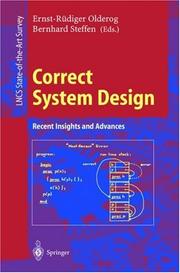
ISSN: 03029743 ISBN: 3540666249 3540480927 9783540666240 Year: 1999 Volume: 1710 Publisher: Berlin: Springer,
Abstract | Keywords | Export | Availability | Bookmark
 Loading...
Loading...Choose an application
- Reference Manager
- EndNote
- RefWorks (Direct export to RefWorks)
Computers are gaining more and more control over systems that we use or rely on in our daily lives, privately as well as professionally. In safety-critical applications, as well as in others, it is of paramount importance that systems controlled by a computer or computing systems themselves reliably behave in accordance with the specification and requirements, in other words: here correctness of the system, of its software and hardware is crucial. In order to cope with this challenge, software engineers and computer scientists need to understand the foundations of programming, how different formal theories are linked together, how compilers correctly translate high-level programs into machine code, and why transformations performed are justifiable. On the occasion of Hans Langmaack's retirement from his professorship and in order to honor his fundamental contributions to the field, the volume editors invited 17 internationally well known researchers to evaluate the state of the art in the area of correct system design. This book presents 17 mutually reviewed invited papers organized in sections on methodology, programming, automation, compilation, and application. It is a unique outline of what has been achieved in the area which dates back to a pioneering paper by Alan Turing in 1949.
System Design --- Computer systems --- Reliability --- System design --- Computer Science --- Engineering & Applied Sciences --- System design. --- Reliability. --- ADP systems (Computer systems) --- Computing systems --- Design, System --- Systems design --- Systems, Computer --- Computer science. --- Special purpose computers. --- Programming languages (Electronic computers). --- Computers. --- Computer logic. --- Mathematical logic. --- Artificial intelligence. --- Computer Science. --- Theory of Computation. --- Logics and Meanings of Programs. --- Programming Languages, Compilers, Interpreters. --- Special Purpose and Application-Based Systems. --- Mathematical Logic and Formal Languages. --- Artificial Intelligence (incl. Robotics). --- Electronic data processing --- System analysis --- Electronic systems --- Cyberinfrastructure --- Information theory. --- Logic design. --- Software engineering. --- Artificial Intelligence. --- Communication theory --- Communication --- Cybernetics --- AI (Artificial intelligence) --- Artificial thinking --- Electronic brains --- Intellectronics --- Intelligence, Artificial --- Intelligent machines --- Machine intelligence --- Thinking, Artificial --- Bionics --- Cognitive science --- Digital computer simulation --- Logic machines --- Machine theory --- Self-organizing systems --- Simulation methods --- Fifth generation computers --- Neural computers --- Computer software engineering --- Engineering --- Informatics --- Science --- Design, Logic --- Design of logic systems --- Digital electronics --- Electronic circuit design --- Logic circuits --- Switching theory --- Algebra of logic --- Logic, Universal --- Mathematical logic --- Symbolic and mathematical logic --- Symbolic logic --- Mathematics --- Algebra, Abstract --- Metamathematics --- Set theory --- Syllogism --- Special purpose computers --- Computers --- Computer languages --- Computer program languages --- Computer programming languages --- Machine language --- Languages, Artificial --- Computer science logic --- Logic, Symbolic and mathematical --- Automatic computers --- Automatic data processors --- Computer hardware --- Computing machines (Computers) --- Electronic calculating-machines --- Electronic computers --- Hardware, Computer --- Calculators --- Cyberspace --- Computer systems - Reliability
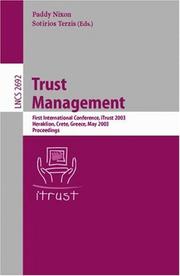
ISSN: 03029743 ISBN: 3540402241 3540448756 9783540402244 Year: 2003 Volume: 2692 Publisher: Berlin: Springer,
Abstract | Keywords | Export | Availability | Bookmark
 Loading...
Loading...Choose an application
- Reference Manager
- EndNote
- RefWorks (Direct export to RefWorks)
iTrust is an Information Society Technologies (IST) working group, which started on 1st of August, 2002. The working group is being funded as a concerted action/ thematic network by the Future and Emerging Technologies (FET) unit of the IST program. The aim of iTrust is to provide a forum for cross-disciplinary investigation of the application of trust as a means of establishing security and con?dence in the global computing infrastructure, recognizing trust as a crucial enabler for meaningful and mutually bene?cial interactions. The proposed forum is intended to bring together researchers with a keen interest in complementary aspects of trust, from technology-oriented disciplines and the ?elds of law, social sciences, and philosophy. Hence providing the c- sortium participants (and the research communities associated with them) with the common background necessary for advancing toward an in-depth underst- ding of the fundamental issues and challenges in the area of trust management in open systems. Broadly the initiative aims to: – facilitate the cross-disciplinary investigation of fundamental issues underp- ning computational trust models by bringing together expertise from te- nology oriented sciences, law, philosophy, and social sciences – facilitate the emergence of widely acceptable trust management processes for dynamic open systems and applications – facilitate the development of new paradigms in the area of dynamic open systems which e?ectively utilize computational trust models – help the incorporation of trust management elements in existing standards.
Computer systems --- Trust --- Reliability --- Trust (Psychology) --- Computer science. --- Computer communication systems. --- Software engineering. --- Information storage and retrieval. --- Artificial intelligence. --- Computers and civilization. --- Computer Science. --- Software Engineering/Programming and Operating Systems. --- Information Systems Applications (incl. Internet). --- Computer Communication Networks. --- Information Storage and Retrieval. --- Artificial Intelligence (incl. Robotics). --- Computers and Society. --- Attitude (Psychology) --- Emotions --- Information storage and retrieva. --- Artificial Intelligence. --- AI (Artificial intelligence) --- Artificial thinking --- Electronic brains --- Intellectronics --- Intelligence, Artificial --- Intelligent machines --- Machine intelligence --- Thinking, Artificial --- Bionics --- Cognitive science --- Digital computer simulation --- Electronic data processing --- Logic machines --- Machine theory --- Self-organizing systems --- Simulation methods --- Fifth generation computers --- Neural computers --- Computer software engineering --- Engineering --- Informatics --- Science --- Information storage and retrieval systems. --- Automatic data storage --- Automatic information retrieval --- Automation in documentation --- Computer-based information systems --- Data processing systems --- Data storage and retrieval systems --- Discovery systems, Information --- Information discovery systems --- Information processing systems --- Information retrieval systems --- Machine data storage and retrieval --- Mechanized information storage and retrieval systems --- Electronic information resources --- Data libraries --- Digital libraries --- Information organization --- Information retrieval --- Application software. --- Civilization and computers --- Civilization --- Communication systems, Computer --- Computer communication systems --- Data networks, Computer --- ECNs (Electronic communication networks) --- Electronic communication networks --- Networks, Computer --- Teleprocessing networks --- Data transmission systems --- Digital communications --- Electronic systems --- Information networks --- Telecommunication --- Cyberinfrastructure --- Network computers --- Application computer programs --- Application computer software --- Applications software --- Apps (Computer software) --- Computer software --- Distributed processing --- Computer systems - Reliability - Congresses --- Trust - Congresses --- Computer networks.
| Listing 1 - 7 of 7 |
Sort by
|

 Search
Search Feedback
Feedback About UniCat
About UniCat  Help
Help News
News